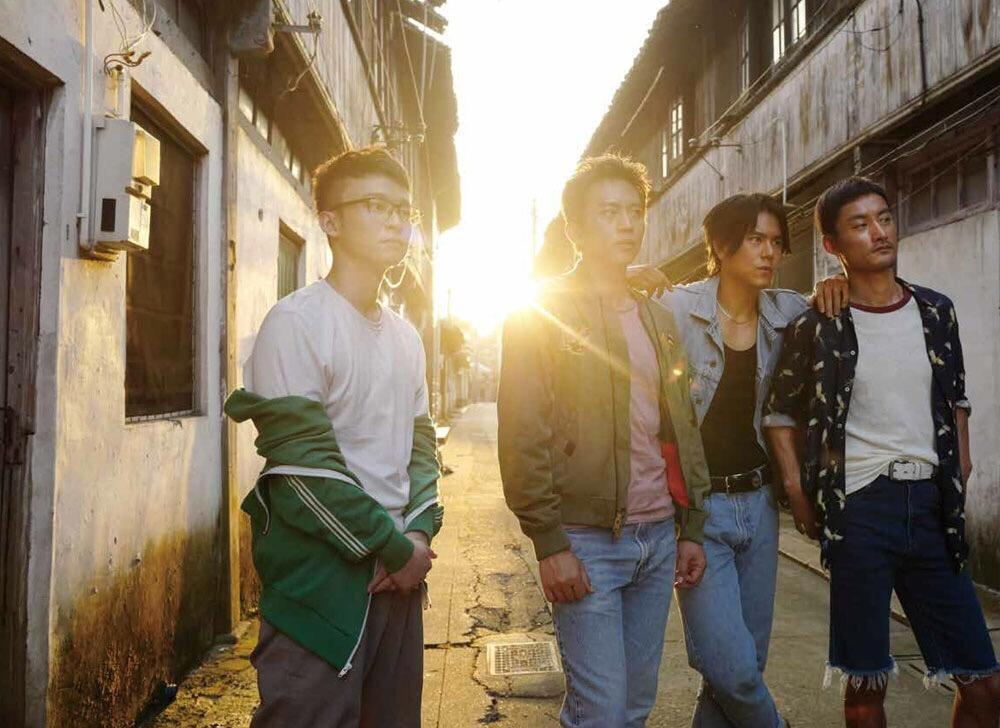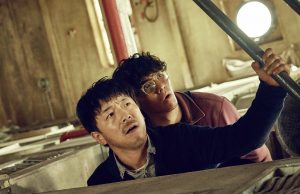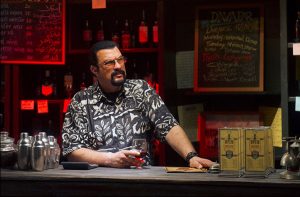Every day while CFI’s Hollywood readers take in the business of the Chinese film industry, the actual movies can sometimes seem exotic or remote. But in major US cities, mainstream Chinese films are increasingly available: thanks to Wanda’s purchase of AMC and distributors like China Lion, they get American theatrical releases practically simultaneous to their premieres at home. Though they receive virtually no publicity outside the non-Chinese community, these films are more than worth seeking out by anyone serious about engaging the Chinese industry, understanding the Chinese sensibility and familiarizing themselves with China’s talent pool. Periodically, CFI will review and point readers in the direction of noteworthy US releases of contemporary commercial and independent Chinese titles.

Duckweed (2017), written by Yu Meng; directed by Han Han .
Grade: A-
It’s been a tumultuous decade since producer Fang Li of Beijing Laurel Films sighed to the foreign press about the fate of two of his movies that fell afoul of China’s censors for portraying a little too much real life grit. Both Lost in Beijing (2007, dir. Li Yu), and Summer Palace (2006, dir. Lou Ye) were barred from domestic distribution but went on to make waves overseas.
Back then, in pre-Olympics China—a long time before anybody could imagine Xi Jinping boasting to the Davos elite of China’s leadership role in globalization—it was too soon for films like Fang’s. It was too soon for films that addressed disaffected youth and, well, youth massacred by China’s army on Tiananmen Square in 1989. Honest self-reflection was deemed potentially too destabilizing.
With Duckweed, Fang is back with a more benevolent dose of mirror-gazing, couched as a time-traveling, father-son bromance, and not only was it approved for theatrical release in China, it represents another feather in the cap of its director, race-car driver/blogger/bestselling author Han Han, from whose life screenwriter Yu Meng has cribbed some ideas.
As the film starts, rally racer Xu Tailang, or “Lang” (Deng Chao) hurtles his souped-up Subaru through China’s gravel backroads, a visual metaphor for the pace at which megacities have pulled Chinese people from the countryside by the hundreds of millions and the Internet has launched them into semi-synch with the rest of the developed world.
But the rally car wrecks, sending Lang back in time to 1998, a pre-cell phone era of snail’s-pace, dial-up modems, and petty criminals who carry beepers as talismans of power.
A natural do-gooder even while acclimating to this disorienting past, twentysomething Lang chases down a purse-snatcher and accidentally meets and befriends his own twentysomething father, Xu Zhengtai, or “Zheng” (Eddie Peng). A source of shame for the grown-up Lang, who really only knows him as a meek man with a checkered past, Zheng is revealed as a swaggering local Robin Hood figure who will, before film’s end, go to jail fighting off a crooked real estate developer just as Lang is born to his mother and snapped back to the future.
Duckweed presents a coming-of-age tale, in which an adult child is surprised to find compassion taking root for a father he has hated while growing up when he is dropped into that very father’s own misspent youth. Lang tails his dad, passing as an oddly-styled stranger who claims to be a local even though no one’s ever heard of him. Together with his followers, Ma the computer nerd (Dong Zijian) and Liu Yi the loyal, if simple, enforcer (Zack Gao), Zheng runs a gang he claims to model after the legendary 1920s Shanghai mob boss, Big Ears Du Yuesheng.
Zheng wants to slow the rapid pace of change in their small town. He runs a protection racket he takes as a moral obligation: in his feud with a rival hood, he’s the guy who wants to shield the young local ladies at the karaoke parlor from being pressed into the lucrative flesh trade, and who wants the bath house to remain “just for bathing.” Zheng rescues Ma from a botched kidnapping, but he and Liu Yi sneer at Ma’s plans to write a computer program to facilitate real time communication among the masses. (Sound familiar?) On a steamy summer night Zheng and Liu Yi shout beerily from the rooftops: “I am just like this world!” and “This world will never change.”
Over noodles that same night, Lang and Ma know different. Ma’s given name is Pony, and Pony Ma, for readers unfamiliar with the founder of China’s largest Internet company, Tencent, will go on to develop the first instant messaging platform in China (ICQ) and evolve it into today’s WeChat, a Twitter-like app that boasts more than one billion active accounts worldwide.
“You don’t belong here.” Lang tells Ma. “Time to go.”
And with 20/20 time-traveling hindsight, Duckweed’s protagonist plants a seed of compassion for those Chinese who lived through the 1990s, as China’s internal campaign of reform met the Internet and started finally to open the country after decades of isolation. Duckweed takes place as China pushed toward joining the World Trade Organization, a move that would catapult it into the future even as it left scads of humanity behind. Back then, Chinese like Zheng and Liu Yi were convinced they could fight off modernization and the corruption, prostitution and crooked real estate developers that came with it, with a little muscle and honor, Du Yuesheng-style, if they just dug in their heels and insisted that their time had already come.
Zheng and his lowlife gang mine an enjoyable vein of comedy based on the juxtaposition of self-assurance and incompetence, and Han Han is clearly a student of Stephen Chow-style buffoonery. The three leads, Deng Chao, superstar heartthrob Eddie Peng, and Zanilla Zhao Liying, one of China’s highest-earning television stars, who plays Lang’s young mother, are all tremendously appealing. Deng is a particular pleasure: he is a loose-limbed comedian whose physicality and manner show the influence of Chow (he was one of the leads in The Mermaid) along with Jackie Chan, but having drunk deeply from those wells, he’s taken their schtick and folded it into something of his own.
Han Han lingers lovingly on the details of life in a river town outside of Shanghai (he comes from Tinglin, and has created a composite location by blending scenes shot there, in Xitang, Changshu, and in Jiashan County), overlaying the bittersweet hangout vibe of Goodbye South, Goodbye onto his basic Back To The Future foundation.
Duckweed gives a pass to those guys who didn’t know what hit them when life in China really accelerated. The story forgives them with humor for falling into petty crime and turf wars, forgives them for their poor judgment. After all, it seems to say, if you were 20 years old and Chinese in 1998, your parents brought you into the world at the end of the Cultural Revolution, which meant they were clueless about the outside world and absolutely paranoid—and with parents like those, how could you be expected to stride smoothly into the 21st century, head held high?
What Han Han and producer Fang Li have achieved here that was impossible ten years ago is a display of self-awareness that presents the drab struggle of modern Chinese life without sugarcoating, but also without dwelling on its dark side in a way that might get it banned. (It is impressive how many of the SAPPRFT censors’ restrictions it manages to take on, including stories based on time-travel and a benevolent depiction of prostitution occurring behind a hair salon front.)
Instead, Duckweed marvels at the mistakes and the naiveté and laughs the survivor’s laugh. It’s a heartwarming story of how far China has come, with pedal to the metal, in a very short time.
WHAT DOES THE GRADE MEAN?
Here are some recent & modern-era vintage Chinese and Hong Kong films for comparison
- A+
- PLATFORM (2000, dir Jia Zhangke)
- THE WORLD (2004, dir. Jia Zhangke)
- DRUNKEN MASTER 2 (1994, dir. Lau Kar Leung & Jackie Chan)
- KUNG FU HUSTLE (2004, dir. Stephen Chow)
- A
- LET THE BULLETS FLY (2010, dir Jiang Wen)
- THE MERMAID (2016, dir. Stephen Chow)
- A TOUCH OF SIN (2013, dir. Jia Zhangke)
- STILL LIFE (2006, dir. Jia Zhangke)
- MOUNTAINS MAY DEPART (2015, dir. Jia Zhangke)
- LITTLE BIG SOLDIER (2010, dir. Ding Sheng)
- EXTRAORDINARY MISSION (2017, dir. Alan Mak & Anthony Pun)
- MR SIX (2015, dir. Guan Hu)
- A WORLD WITHOUT THIEVES (2004, dir. Feng Xiaogang)
- SUZHOU RIVER (1999, dir. Lou Ye)
- HOUSE OF FLYING DAGGERS (2004, dir Zhang Yimou)
- RAISE THE RED LANTERN (1991, dir. Zhang Yimou)
- A-
- DUCKWEED (2017, dir. Han Han)
- I BELONGED TO YOU (2016, dir. Zhang Yibai)
- B+
- THE GREAT WALL (2016, dir. Zhang Yimou)
- OLD STONE (2016, dir. Johnny Ma)
- CRAZY STONE (2006, dir. Ning Hao)
- GO, LALA GO (2010, dir. Xu Jinglei)
- B
- KUNG FU YOGA (2017, dir. Stanley Tong)
- RAILROAD TIGERS (2016, dir. Ding Sheng)
- THE WASTED TIMES (2016, dir. Cheng Er)
- CHONGQING HOT POT (2016, dir. Yang Qing)
- MONSTER HUNT (2015, dir. Raman Hui)
- B-
- JOURNEY TO THE WEST: THE DEMONS STRIKE BACK (2017, dir. Tsui Hark)
- SOME LIKE IT HOT (2017, dir. Song Xiaofei & Dong Xu)
- BORN IN CHINA (2016, dir. Lu Chuan)
- D-
- TINY TIMES (2013, dir. Guo Jingming)





